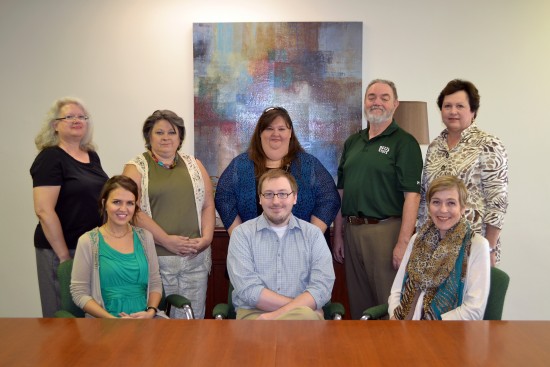 Celebrating the $1,125,278 Behavioral Health Workforce Education and Training for Professionals and Paraprofessionals grant were: (front, l to r): Cat Vincent, Dr. Bryon Pickens and Dr. Juawice McCormick. Back: Sally Zengaro, Robin Boyles, Dr. Mistie Barnes, Dr. George Beals and Dr. Leslie Griffin.
Celebrating the $1,125,278 Behavioral Health Workforce Education and Training for Professionals and Paraprofessionals grant were: (front, l to r): Cat Vincent, Dr. Bryon Pickens and Dr. Juawice McCormick. Back: Sally Zengaro, Robin Boyles, Dr. Mistie Barnes, Dr. George Beals and Dr. Leslie Griffin.The Health Resources and Services Administration of the U.S. Department of Health and Human Services recently announced a major grant award to Delta State’s Division of Counselor Education and Psychology in the College of Education and Human Sciences.
Dr. Bryon Pickens, assistant professor, and the Counselor Education faculty have been awarded the Behavioral Health Workforce Education and Training for Professionals and Paraprofessionals grant totaling $1,125,278 over the next three years.
The funding will provide internship stipends for 83 master’s level counseling students and funds for division staff to engage in recruiting activities over the three-year project period.
Its overall purpose is to address the ongoing unmet mental health needs in the Mississippi Delta by funding the final field placement experiences of master’s level counseling students.
This will develop and expand the substance abuse and mental health workforce who, following their training, will focus on children, adolescents and transitional-age youth at risk for developing, or who have developed, a recognized behavioral health disorder.
All 18 counties of the Mississippi Delta have been designated as Mental Health Professional Shortage Areas. Only 43 percent of Mississippi children ages 2-17 identified as having emotional, developmental or behavioral problems received mental health treatment, compared to 60 percent of such children nationwide.
Dr. Leslie Griffin, dean of the College of Education and Human Sciences said, “Dr. Pickens and faculty colleagues in the Counselor Education programs are sensitive to the needs of the Delta — particularly in terms of providing students in counseling programs much-needed financial support to fulfill the rigorous internship experiences associated with the program.
“They understand that for students to take advantage of quality professional preparation in the counseling field, partners such as the Health Resources and Services Administration provide the means to lift up these students and ultimately the region.”
Robin Boyles, director of the Office of Institutional Grants, stresses the value of these grants for the Delta State community.
“This grant funding provides the Counselor Education Program with resources for increased recruitment activities, and provides financial support for our students fulfilling their internship required for degree completion, while also addressing the community need of increasing the behavioral health workforce and providing much-needed mental health services to children and families.
“It’s a win-win for the department, graduate students and the community.”
The stipends will help with economic needs of counselor education students, as over 80 percent are eligible for need-based financial aid.
Delta State’s Counselor Education Program is accredited by the Council for Accreditation of Counseling and Related Educational Programs (CACREP). This is the first year that programs accredited by CACREP have been invited to apply for this funding opportunity.
Delta State University’s Counselor Education Program is among the first CACREP- accredited programs to receive this grant. Learn more about the program at https://www.deltastate.edu/college-of-education/counselor-education-and-psychology.

